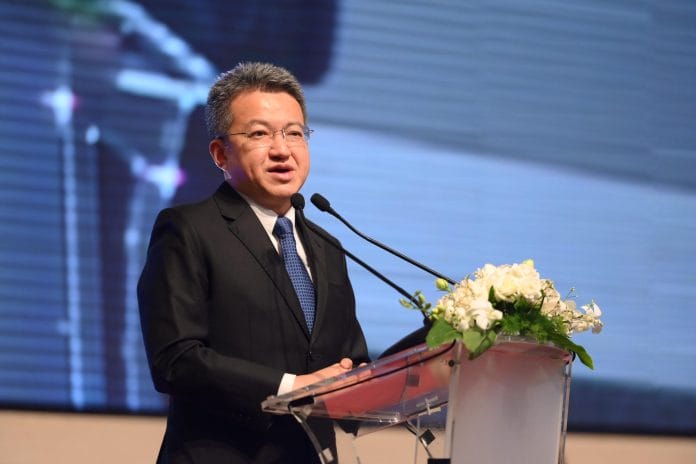As the geopolitical tensions escalate and conflicts dominating global headlines, the Asia-Pacific Economic Cooperation (APEC) emerges as a hope for a peaceful and prosperous future. The Deputy Minister of Investment, Trade and Industry (MITI), Liew Chin Tong during his speech at the APEC Business Advisory Council (ABAC) Meeting Opening Ceremony reflected on the current state of global affairs, emphasising that the world was more optimistic three decades ago.
However, the idea of the Asia Pacific and APEC serves as a reminder of an alternative vision – one of collaboration and prosperity. In the face of contemporary divisiveness, economic cooperation among nations remains a noble pursuit. The existence of APEC has provided a unique platform for nations such as the United States, China, and the Russian Federation, alongside subnational economies, to sit together at the same table.
“In other words, the existence of APEC itself is already a cause for us to celebrate and, more importantly, APEC gives us an organisational form and an alternative vision. Indeed, APEC gives us hope in an otherwise darker period of global history.” he said.
World’s New Trade Agenda
“The world needs a new trade agenda. It can’t be the regurgitation of old cliches but rather a fresh approach.” he added.
During his speech, Tong said the new trade agenda must prioritise fair wages for workers and the sustainability of a strong middle class across both advanced and developing economies. Additionally, it should prioritisze environmental concerns by placing climate at its center. To ensure adequate funding for essential services like healthcare and promote social cohesion, states must receive sufficient taxes from multinational corporations.
Trade policies must bridge the gap between environmental sustainability, the stability of the middle class, and the well-being of the workforce. This entails ensuring that workers feel secure in their livelihoods and have the purchasing power to contribute as consumers, not just laborers.
Consequently, the focus of the new trade agenda should shift from a race to the bottom to creating conditions that foster economic growth and prosperity, thereby enabling economies to compete at the highest levels.
Malaysia’s Economic Takeoff Alligned with APEC Priorities
Malaysia views APEC as a pivotal platform for articulating its economic strategies and ambitions, with a focus on fostering a vibrant digital landscape and safeguarding the environment, in alignment with the core principles of the organisation.
In line with this commitment, Malaysia introduced two groundbreaking national policies last year: the New Industrial Master Plan (NIMP 2030) and the National Energy Transition Roadmap (NETR). These policies coincide with what Deputy Minister Liew Chin Tong referred to as Malaysia’s “second economic takeoff.” At their core, these policies are closely aligned with Malaysia’s dedication to APEC’s objectives of facilitating trade and enhancing economic cooperation. They underscore Malaysia’s emphasis on innovation and the adoption of cutting-edge technology, prioritization of environmental, social, and governance (ESG) initiatives, acceleration of the energy transition, and pursuit of inclusive growth.
Particularly emphasising the importance of inclusive growth, MITI Deputy Minister said “I highly commend APEC Peru’s efforts this year to promote the transition of informal economic actors to the formal and global economy. Such an initiative resonates well with our priorities, due to the similarities in our economic makeup.
“As I have constantly advocated, Malaysia needs to envisage ourselves to become a middle-class society, with Micro, Small and Medium Enterprises (MSMEs) playing a monumental role as the backbone of our economy.” he added.
ABAC As A Key To Success
APEC serves as a crucial forum for communication among member economies, particularly significant in today’s geographically tense era. Despite challenges, Tong emphasised that the regular meetings of member economies within APEC demonstrate a remarkable feat of cooperation. Within this policy alignment context, the APEC Business Advisory Council (ABAC) plays a vital role.
Beyond its role in facilitating trade and investment agendas, ABAC is urged to emerge as a stalwart champion of dialogue and understanding. It must proactively promote economic stability and sustainability in the region. Through open communication, shared interests, and a steadfast commitment to economic cooperation, ABAC aims to bridge divides and strengthen the resilience of the Asia-Pacific region.
The perspectives and insights shared by ABAC will guide governments in realising APEC’s vision and mission. To fully leverage the boundless opportunities for growth, fostering public-private partnerships and enhancing cooperation between APEC governments and the private sector is paramount. These partnerships are essential for achieving tangible outcomes that drive collaboration, innovation, and progress.
“With this spirit, I believe that all APEC economies are looking forward to hearing ABAC recommendations including through ABAC’s Annual Recommendations to Leaders, especially those recommendations that could be a springboard for greater collaboration, innovation, and progress.” Tong said.









